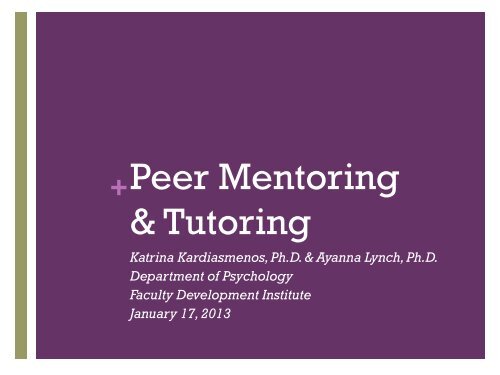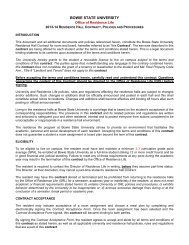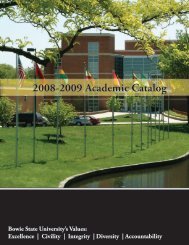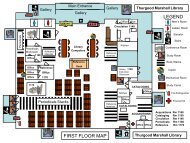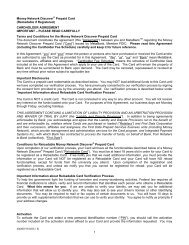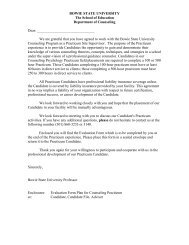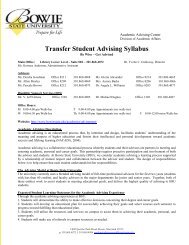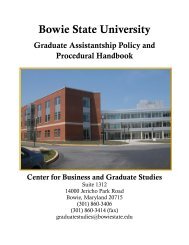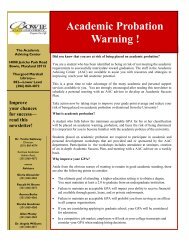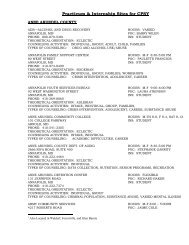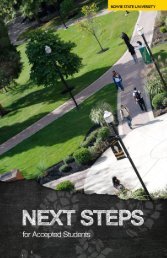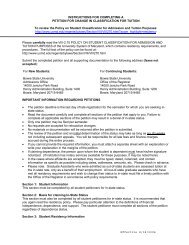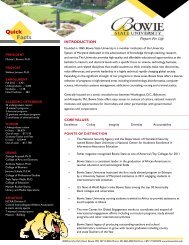Peer Mentoring & Tutoring - Bowie State University
Peer Mentoring & Tutoring - Bowie State University
Peer Mentoring & Tutoring - Bowie State University
You also want an ePaper? Increase the reach of your titles
YUMPU automatically turns print PDFs into web optimized ePapers that Google loves.
+ <strong>Peer</strong> <strong>Mentoring</strong><br />
& <strong>Tutoring</strong><br />
Katrina Kardiasmenos, Ph.D. & Ayanna Lynch, Ph.D.<br />
Department of Psychology<br />
Faculty Development Institute<br />
January 17, 2013
+ Purpose<br />
• Primary Goal of the General Psychology redesign<br />
(PSYC 101) was to increase retention and lower<br />
failure rates of students in general psychology.<br />
• High achieving Junior and Senior undergraduate psychology<br />
majors recruited as Undergraduate Learning Assistants<br />
(ULAs)<br />
• Function as peer mentors and tutors to cohort of ~250<br />
students enrolled in PSYC 101 across several sections
+<br />
To systematically measure:<br />
Two<br />
Primary<br />
Goals<br />
• the effectiveness of peer<br />
mentoring and tutoring on<br />
student performance in PSYC<br />
101.<br />
• changes in ULA self-efficacy<br />
and self-confidence in the<br />
ability to teach a course<br />
before and after serving in this<br />
role.
+<br />
Goal 1:<br />
Measure the ULAs<br />
impact on student<br />
performance.<br />
Effectiveness of peer mentoring and<br />
tutoring on student performance in<br />
PSYC 101.<br />
• Research Question 1:<br />
• Does the inclusion of ULAs in PSYC 101<br />
have a measureable effect on student<br />
performance<br />
• Research Question 2:<br />
• Are PSYC 101 students more likely to<br />
seek course assistance from the<br />
peer mentors/tutors as compared to<br />
the course instructors<br />
• Research Question 3:<br />
• Do students enrolled in PSYC 101 find<br />
that the assistance provided by the<br />
ULAs is helpful
Measure changes in teaching self-efficacy<br />
and self-confidence before and after<br />
participating in ULA program for one or two<br />
semesters.<br />
• Research Question:<br />
• Does teaching self-efficacy and selfconfidence<br />
improve after serving as a<br />
ULA for one or two semesters<br />
+<br />
Goal 2:<br />
Measure the impact<br />
of peer mentoring<br />
experience on the<br />
ULAs.
+ Methods<br />
• Goal 1: Measure effectiveness of peer<br />
mentoring and tutoring on student<br />
performance in PSYC 101.<br />
• Document frequency and type of assistance sought by<br />
PSYC 101 students from ULAs.<br />
• Compare grades on specific assignments and overall<br />
course performance between help-seekers (HS) and<br />
(NS) non-help seeking students<br />
• Administer an anonymous survey to PSYC 101 students at<br />
finals<br />
• Compare self-reported frequency of help sought from<br />
ULAs and instructor.<br />
• Assess student ratings of effectiveness of assistance<br />
provided by the ULAs.
+ Methods<br />
• Goal 2: Measure self-efficacy<br />
and self-confidence in the<br />
ability to teach a course<br />
before serving as a ULA<br />
• Administer pre- and post- selfefficacy<br />
measure and selfconfidence<br />
questionnaire to<br />
ULAs<br />
• Before and after serving as a<br />
ULA<br />
• Both first and second<br />
semester ULAs
+ Qualitative Results<br />
• ULAs report that it is difficult to keep track of students they<br />
help because often they are getting stopped in Wiseman, on<br />
their way to class, walking across campus, etc.<br />
• Second semester ULAs, in a reflection paper written at the<br />
end of the semester, report that after being a ULA, they want<br />
to be a teacher/professor.
+<br />
Spring 2013<br />
• Continue assessment and data<br />
analysis<br />
• Compare results to similar studies<br />
• Use results to make improvements<br />
in PSYC 101 and ULA courses<br />
• Prepare manuscript and proposals<br />
for conference presentations
+ What We Have Learned Thus Far<br />
•ULAs are critical to student success in PSYC 101<br />
•Students feel far more comfortable seeking<br />
academic guidance from peer mentors than<br />
instructors<br />
• Students stop ULAs on campus<br />
• Students limit interaction with instructors to<br />
administrative issues
+ Discussion<br />
• Comments<br />
• Questions<br />
• Could peer mentoring make a difference in other courses
+ Acknowlegements<br />
• Dr. Eva Garrin, CETL Director<br />
• Dr. Cheryl Blackman, Chair, Psychology Department<br />
• Drs. Christine Harrell & Erika Hernandez, PSYC 101 Instructors<br />
• 2012-2013 Grad Assistants & ULAs<br />
• Sarah Stout (special assistant involved in data analysis)


